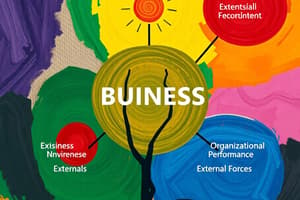Podcast
Questions and Answers
What does environmental uncertainty in a business context refer to?
What does environmental uncertainty in a business context refer to?
- The financial security of an organization.
- The impact of technological advancements only.
- The internal dynamics within an organization.
- The degree of change and complexity in the environment. (correct)
Which of the following is NOT a major force in the general environment?
Which of the following is NOT a major force in the general environment?
- Socio-cultural factors
- Legal factors
- Market competition (correct)
- Economic factors
Which factor would be included under the technological force in the general environment?
Which factor would be included under the technological force in the general environment?
- Cultural attitudes towards foreign products.
- The presence of technological infrastructures. (correct)
- Inflation rates affecting purchasing power.
- Government regulations on trade.
Which component falls under the demographic factor of the general environment?
Which component falls under the demographic factor of the general environment?
Which of the following factors would not be considered part of an international PESTEL analysis?
Which of the following factors would not be considered part of an international PESTEL analysis?
Which of the following defines the competitive environment?
Which of the following defines the competitive environment?
Which factor is considered a part of the environmental force in the general environment?
Which factor is considered a part of the environmental force in the general environment?
What aspect of the international PESTEL analysis is influenced by cultural diversities?
What aspect of the international PESTEL analysis is influenced by cultural diversities?
Which factor decreases industry profits according to the bargaining power of suppliers?
Which factor decreases industry profits according to the bargaining power of suppliers?
In the context of competitors, which situation leads to higher intensity of rivalry?
In the context of competitors, which situation leads to higher intensity of rivalry?
What do visible artifacts in organizational culture NOT include?
What do visible artifacts in organizational culture NOT include?
Which dimension of organizational culture emphasizes results over processes?
Which dimension of organizational culture emphasizes results over processes?
What is a characteristic of a strong organizational culture?
What is a characteristic of a strong organizational culture?
How can barriers to entry affect industry profitability?
How can barriers to entry affect industry profitability?
Which of the following is NOT an example of an internal stakeholder?
Which of the following is NOT an example of an internal stakeholder?
What is a primary responsibility of managers concerning stakeholders?
What is a primary responsibility of managers concerning stakeholders?
Which of the following factors does NOT affect the bargaining power of buyers?
Which of the following factors does NOT affect the bargaining power of buyers?
What is the primary role of distributors within the competitive environment?
What is the primary role of distributors within the competitive environment?
Which type of culture might lead to contradictory messages among employees?
Which type of culture might lead to contradictory messages among employees?
Which organization characteristic signifies a higher chance of organizational innovation?
Which organization characteristic signifies a higher chance of organizational innovation?
What type of stakeholder is represented by local communities?
What type of stakeholder is represented by local communities?
Which of the following correctly describes the effect of high barriers to exit?
Which of the following correctly describes the effect of high barriers to exit?
Flashcards
Business Environment
Business Environment
The surroundings that affect an organization's performance. This includes factors that are outside the organization's control, such as laws, competitors, and cultural trends.
Environmental Uncertainty
Environmental Uncertainty
The level of change and complexity in an organization's surroundings. A high level of uncertainty means the environment is rapidly changing and unpredictable.
General Environment
General Environment
The broad factors that are important to a business. It includes things like politics, economics, social trends, technology, and the environment.
Competitive Environment
Competitive Environment
Signup and view all the flashcards
Economic Factors (General Environment)
Economic Factors (General Environment)
Signup and view all the flashcards
Technological Factors (General Environment)
Technological Factors (General Environment)
Signup and view all the flashcards
Political and Legal Factors (General Environment)
Political and Legal Factors (General Environment)
Signup and view all the flashcards
Socio-cultural Factors (General Environment)
Socio-cultural Factors (General Environment)
Signup and view all the flashcards
Rivalry Among Competitors
Rivalry Among Competitors
Signup and view all the flashcards
Barriers to Entry
Barriers to Entry
Signup and view all the flashcards
Bargaining Power of Suppliers
Bargaining Power of Suppliers
Signup and view all the flashcards
Bargaining Power of Buyers
Bargaining Power of Buyers
Signup and view all the flashcards
Threat of Substitutes
Threat of Substitutes
Signup and view all the flashcards
Organizational Culture
Organizational Culture
Signup and view all the flashcards
Strong Culture
Strong Culture
Signup and view all the flashcards
Weak Culture
Weak Culture
Signup and view all the flashcards
Visible Artefacts
Visible Artefacts
Signup and view all the flashcards
Invisible Culture
Invisible Culture
Signup and view all the flashcards
Adaptability
Adaptability
Signup and view all the flashcards
Attention to Detail
Attention to Detail
Signup and view all the flashcards
Stakeholders
Stakeholders
Signup and view all the flashcards
Stockholders
Stockholders
Signup and view all the flashcards
Study Notes
Business Environment
- Environment encompasses external institutions affecting organizational performance.
- Importance stems from differing environmental uncertainty levels.
- Environmental uncertainty measures the degree of change and complexity in the external environment.
- Change: Frequency of components' alterations.
- Complexity: Number of components and organizational knowledge about them.
General Environment
- An organization's external environment has two levels: general and competitive.
- The general environment includes broader factors affecting all organizations:
- Political, economic, socio-cultural, technological, environmental, and legal (PESTEL) factors.
Major Forces in the General Environment
- Economic: Interest rates, inflation, unemployment, economic growth.
- Technological: Infrastructure, advancements, industrial innovations, production/distribution changes.
- Political and legal: Political stability, government regulations, legal changes.
- Socio-cultural: Customs, values, traditions, lifestyles, beliefs, behavior patterns.
- Demographic: Population characteristics (age, gender, ethnicity, etc.).
- Environmental: Production pollution, sustainable energy, climate change.
- International: Involvement in, or impact from, global business.
- International PESTEL Analysis:
- Political: Government attitudes, stability, intellectual property.
- Economic: Growth, wealth distribution, currency, exchange rates.
- Socio-cultural: National cultures, attitudes toward foreign entities.
- Technological: Telecom, power, import/export infrastructure.
- Environmental: Resources, pollution, climate change impacts.
- Legal: Tariffs, trade agreements, employment laws, taxation.
Competitive Environment
- The competitive environment are forces stemming from suppliers, distributors, customers, and competitors.
- Suppliers provide resources for goods/services.
- Distributors help sell goods/services.
- Customers purchase the organization's outputs.
- Competitors provide similar products/services.
Porter's Five Forces Model
- A method for evaluating industry attractiveness.
- Rivalry among competitors:
- Number of competitors, balanced size, demand growth, product differentiation, exit barriers.
- Threat of new entrants:
- Entry barriers (capital, economies of scale, licenses, customer loyalty).
- Bargaining power of suppliers:
- Number of suppliers, customer purchasing patterns, supplier expansion capability, supplier switching costs.
- Bargaining power of buyers: The power of customers to negotiate prices.
- Threat of substitutes: Similar products from other industries.
Organizational Culture
- Organizational culture embodies shared values, principles, traditions, and practices.
- Strong culture: Clear values, widespread agreement, employee identification.
- Weak culture: Limited values, lack of employee identification, mixed messages.
- Levels of organizational culture:
- Visible artifacts (e.g., dress, behavior, symbols, ceremonies).
- Values and beliefs (observed from stories, language, symbols).
- Underlying assumptions (role modeling, legends, nicknames).
- Dimensions of organizational culture:
- Adaptability, attention to detail, outcome orientation, people orientation, team orientation, integrity.
- Establishment of organizational culture:
- Founder's vision, transmitted through stories, symbols, language, employee selection/socialization, top management actions.
Stakeholders
- Stakeholders are individuals/groups interested in a company.
- External stakeholders (customers, suppliers, creditors, governments, unions, communities, public).
- Internal stakeholders (stockholders, employees, managers, executives, board).
- Stakeholder claims:
- Stockholders: Maximize returns.
- Managers: Benefit stakeholders, resource efficiency.
- Employees: Rewards for performance.
- Suppliers: Fair and prompt payment.
- Distributors: Quality products, agreed prices.
- Customers: Attraction for business survival.
- Community: Infrastructure for operations.
Studying That Suits You
Use AI to generate personalized quizzes and flashcards to suit your learning preferences.




